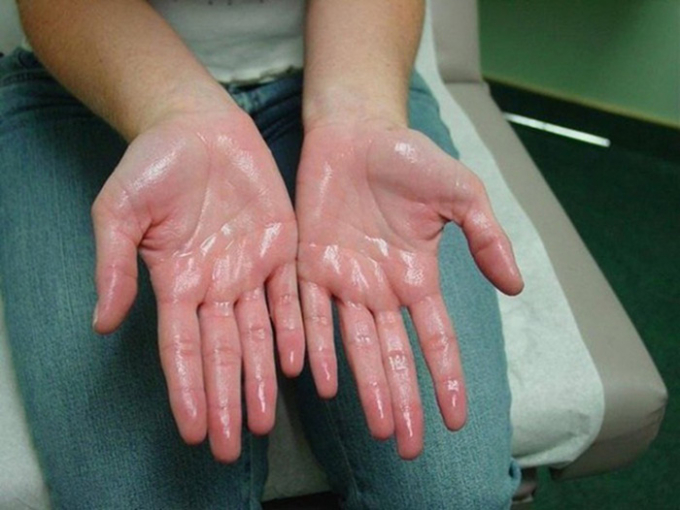Dr. Chu Thuy of the No. 4 People's Hospital of Xi'an (Shaanxi, China) said that sweating is a very normal physiological manifestation of the human body. When the body's surface temperature exceeds 37 degrees Celsius, we need to sweat to dissipate heat. However, the characteristics of sweating such as the amount, smell, location, and timing can be different for each person. Because we have differences in sweat glands, physical condition, exercise habits, age, and environment.
However, Dr. Chu warns that some abnormalities in sweating, the most common being sweating too little or too much, can also be a sign of illness. Whether it's winter or summer, if you sweat too much in these 4 places, it's best to go to the hospital for a check-up soon:
1. Palm
Normally, our hands do not sweat much when the weather is not too hot. But if your hands are always damp with sweat, you need to be aware that it may be due to hyperhidrosis. This condition is caused by excessive sweat secretion in the hands without being affected by the outside temperature. It is also often related to disorders of the sympathetic nervous system. Patients may have abnormal sweating in the feet, armpits and groin. These sweat-producing parts are susceptible to dermatitis, rashes and some other diseases.

In addition to hyperhidrosis, excessive sweating in the palms can also be caused by liver and kidney problems (Illustration photo)
In addition, Dr. Chu also warned that excessive sweating in the hands could also be due to an internal infection in the body. Some organs responsible for detoxification such as the liver and kidneys are dysfunctional or have reduced function. Excessive sweating of the hands is also common in pregnant women due to hormonal changes, alcoholism, obesity or side effects of certain medications.
2. Head
You may sweat on your head when the weather is too hot or when you exercise vigorously, or when your head is too covered. But if only your head sweats regularly or sweats too much, it is very likely that your body has a hidden disease.
The difference with this type of sweating is that the head sweats easily, the skin on the head - face - neck may be itchy but the whole body does not sweat. According to Dr. Chu, this phenomenon is common in people with neurological diseases, especially anxiety disorders. It can also be due to liver or blood vessel disease. If it occurs in adults and is accompanied by weight loss, pain, fever, and prolonged fatigue, it can be due to cancer.
As for the phenomenon of excessive sweating of the head, whether in winter or summer, it is often related to long-term diseases of internal organs, leading to excretory dysfunction. The organs related to excessive sweating of the head can be the heart, liver and gallbladder, or the spleen and stomach.
3. Nose
Most people who sweat a lot in their nose often think that it is their “genetic makeup” or that they have oily skin, which causes excess oil secretion, leading to a moist T-zone on their face. However, abnormal sweating in this area can reflect many health problems.

Abnormal sweating in the nose is often related to lung health and immune deficiency (Illustration photo)
Dr. Chu said that if the nasal sweat is concentrated on the bridge of the nose and both sides of the nose, the problem is usually in the lungs. Traditional medicine has long believed that this is a sign of insufficient lung qi and too much lung humidity. Modern medicine adds that it is due to the lungs accumulating many toxic substances, decreased function, lung capacity, or even pulmonary edema.
4. Back
The back is a place that easily sweats when hot or when exercising vigorously, but it can also hide many health problems. Especially if you sweat on your back even when it is cool, sitting in one place or sleeping at night or during the day and other parts do not experience the same condition.
Dr. Chu reminded that this could be due to hormonal imbalance, causing dysfunction of the hypothalamus, leading to increased body temperature. This condition is often seen in some endocrine diseases such as hyperthyroidism (excess thyroid hormone), diabetes (insulin deficiency), hypoglycemia, etc.
Source and photo: QQ, Family Doctor
Source: https://giadinh.suckhoedoisong.vn/du-dong-hay-he-do-qua-nhieu-mo-hoi-o-4-noi-nay-tren-co-the-nghia-la-trong-nguoi-day-benh-tat-172240622061027543.htm























































































![[Infographic] In 2025, 47 products will achieve national OCOP](https://vphoto.vietnam.vn/thumb/402x226/vietnam/resource/IMAGE/2025/7/16/5d672398b0744db3ab920e05db8e5b7d)














Comment (0)